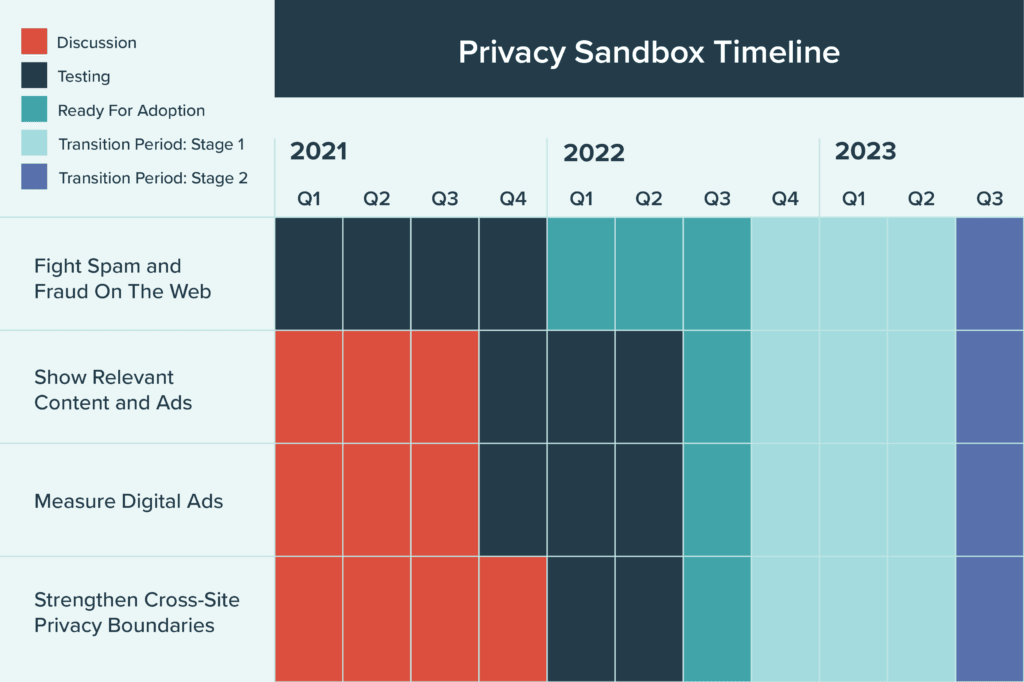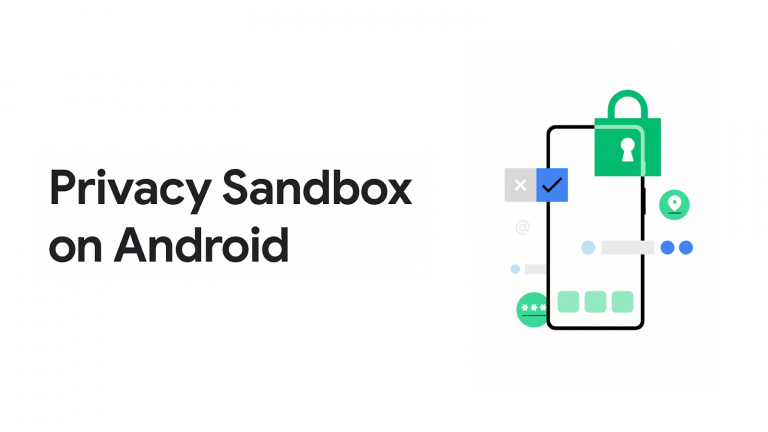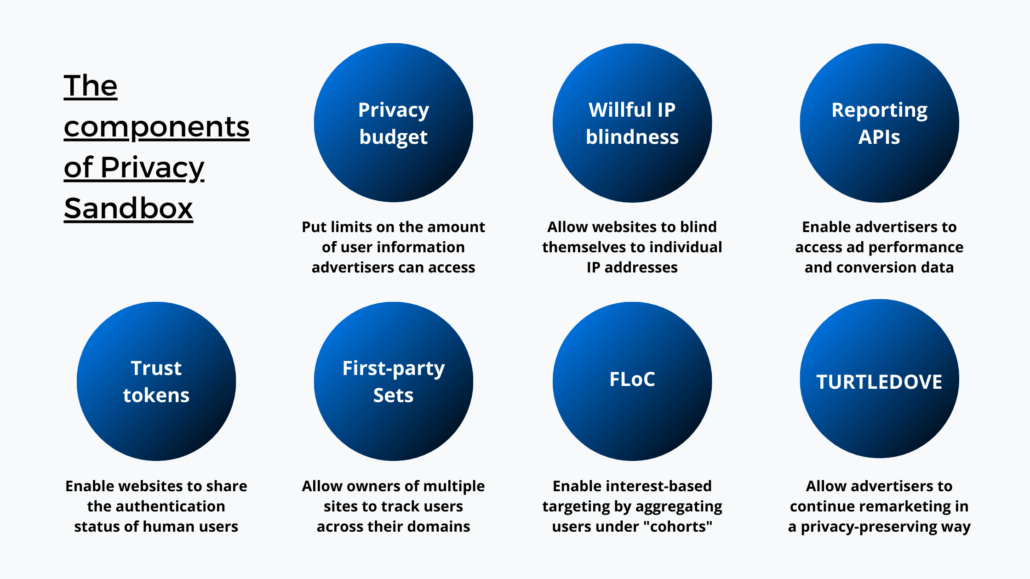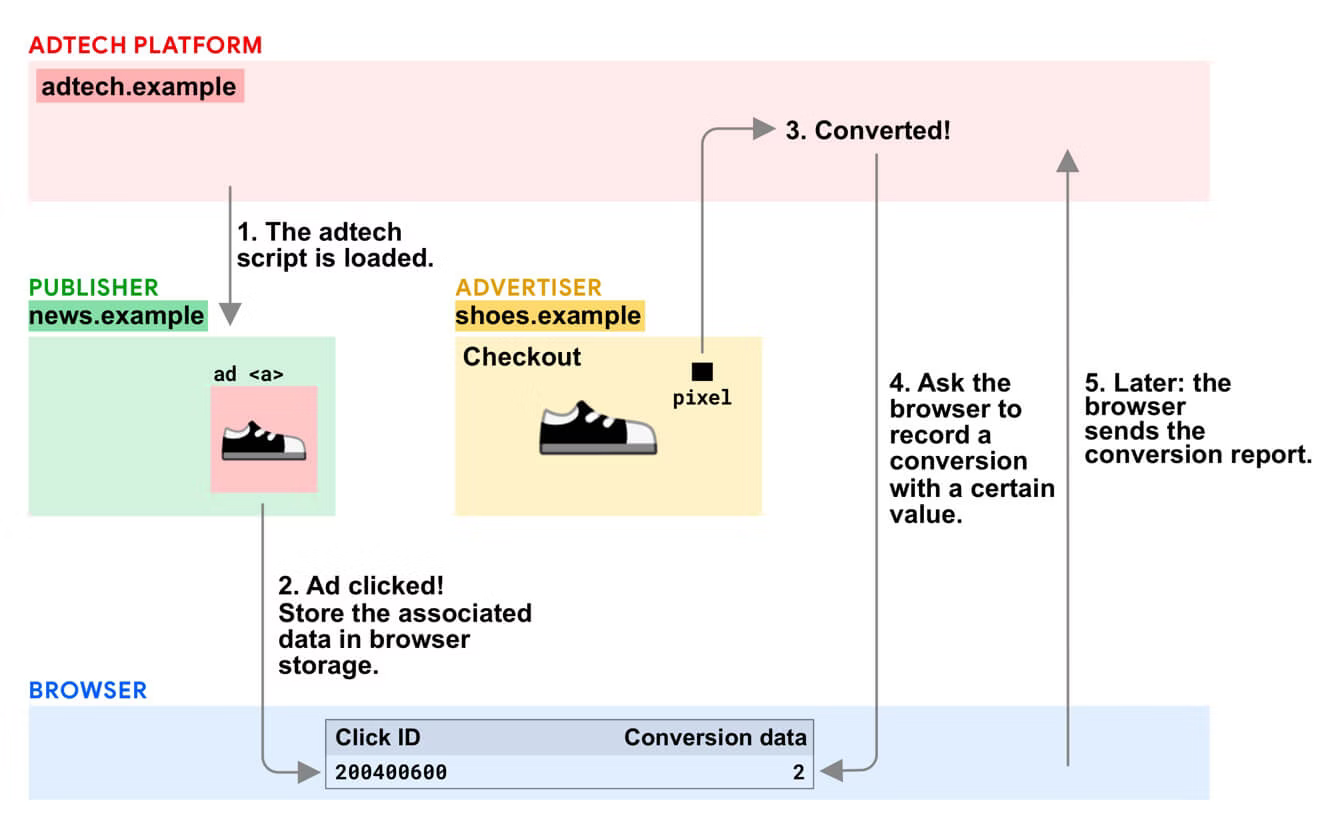Mobile applications are an integral part of our daily life. Currently, over 90% of the apps on Google Play are free, providing access to valuable content and services for billions of users. Digital advertising plays a key role in making this possible. But to ensure a healthy app ecosystem that benefits users, developers, and businesses, the industry must continue to evolve how digital advertising works to improve user privacy.
Google realizes that without first providing an alternative privacy-preserving policy, such updates may be ineffective and result in worse privacy implications for users’ privacy and developer businesses.
The Privacy Sandbox on Android initiative aims to create technologies that both protect people’s online privacy and provide companies and developers with the tools to build thriving digital businesses. The Privacy Sandbox reduces tracking between sites and apps without compromising access to free content and services.
The main goals of the privacy sandbox on Android are:
While these new solutions are being developed, built, and tested, Google plans to maintain the existing features of the advertising platform for at least two years and will provide advance notice of any future changes.

Recently Google has introduced its take on Apple’s App Tracking Transparency system with the reveal of the Privacy Sandbox for Android.
Google advertised its system as one where it would work with the industry and developer community to balance the need for user privacy with the needs of the business.
In general, the system will include phasing out the Advertising ID tracking feature, while still allowing advertisers to serve personalized ads to groups of users with similar interests. This builds on Google’s work developing “Topics” that offer users more control and transparency over the ads they see.

Compared to iOS apps, many Android apps are free and ad-supported, so Google’s decision not to make policy changes that disrupt the existing ecosystem makes sense for the company.
Android serves as a gateway for displaying ads that benefit Google.
In addition, Google pointed out that Apple’s approach could lead advertisers to turn to other, less visible user tracking tools, which is also bad for users.
Some critics have called Google’s plans powerless as an additional system for advertisers. Whereas others pointed out that Google can’t do anything to stop its competitors from running “effective ads on Android” because it’s seen as an advertising monopoly, limiting its ability to make a difference in the space.
While Google prepares a plan for further updates, the privacy of Android users remains unchanged.

Marketers need to rethink their approach to personalized advertising and adjust their data collection and targeting tactics to move towards strategies to leverage their data.
The basic form of the Google Privacy Sandbox will be a virtual space that will allow the testing of certain features. This initiative aims to turn a series of APIs into a new set of open web standards. The current standards will be replaced by more privacy-focused ones, while at the same time allowing the advertising industry to run targeted advertising campaigns.
The APIs will act as a software intermediary between the user and the advertiser, improving security and protecting user privacy by allowing targeted ads to be served.
For digital advertising agencies and websites that generate the bulk of their ad revenue, the Conversion Measurement API allows marketers to measure ad-based purchases and associate them with specific ads without using persistent cross-site identifiers. Mobupps team of professionals has been measuring such data for a long time and knows how to competently promote the products of our clients, increasing the level of user engagement and revenue.
The Trust Token API will provide the trusted user with a cryptographic token that is stored in their browser. This token can then be used to authenticate the user, passing this “trust” from one context to another without exposing information about the user. Mobupps supports user authentication to combat fraud, using our proprietary technology we are working to detect fraud occurring on mobile devices while protecting user privacy.

It is necessary to adapt current advertising processes to comply with the restrictions of the Google Privacy Sandbox. According to Google, FLoC ads generate about 95% of conversions per dollar spent compared to current ad models. This means that companies will be able to target ads based on the interests of specific groups of people without the need to collect data about individual users, without losing significant revenue.
Our team is engaged in broad targeting, covering a large audience, and we prefer to segment ads to attract more users. Through the FLEDGE offering, advertisers will be able to create and bid on audiences without requiring third-party cookies or specific user data.
Another important point to pay attention to is probabilistic attribution. Probabilistic attribution is a mobile attribution technique that is often used in conjunction with deterministic methods (cookies or advertising IDs) to recognize a mobile device, laptop, or browser. Because probabilistic attribution relies on trying to match device data to a user database, this method is usually less accurate and is used as a fallback when a deterministic ID is not available.
Speaking of iOS 14, probabilistic attribution has the same requirements as using an IDFA advertising ID in terms of obtaining the user’s consent to be tracked. Targeted advertising is currently configured based on media content and creatives, so the use of custom databases is not relevant.
Since the Privacy Sandbox is still in development, we cannot know exactly how Google plans to implement probabilistic attribution. Mobupps might suggest that when Google launches the Privacy Sandbox and retires GAID, doing deterministic or probabilistic attribution on Android will be very difficult, if not impossible.
Mobupps believes that targeted advertising is the future, so companies that start the process of adapting to new technology and new privacy restrictions now will have a competitive advantage when the Google Privacy Sandbox will work. We saw a similar situation with the Apple policy update, and Mobupps has completed a similar task with Apple SkadNetwork, so here we are sure that this will only bring success to digital marketing companies.
Mobile applications are an integral part of our daily life. Currently, over 90% of the apps on Google Play are free, providing access to valuable content and services for billions of users. Digital advertising plays a key role in making this possible. But to ensure a healthy app ecosystem that benefits users, developers, and businesses, the industry must continue to evolve how digital advertising works to improve user privacy.
Google realizes that without first providing an alternative privacy-preserving policy, such updates may be ineffective and result in worse privacy implications for users’ privacy and developer businesses.
The Privacy Sandbox on Android initiative aims to create technologies that both protect people’s online privacy and provide companies and developers with the tools to build thriving digital businesses. The Privacy Sandbox reduces tracking between sites and apps without compromising access to free content and services.
The main goals of the privacy sandbox on Android are:
While these new solutions are being developed, built, and tested, Google plans to maintain the existing features of the advertising platform for at least two years and will provide advance notice of any future changes.

Recently Google has introduced its take on Apple’s App Tracking Transparency system with the reveal of the Privacy Sandbox for Android.
Google advertised its system as one where it would work with the industry and developer community to balance the need for user privacy with the needs of the business.
In general, the system will include phasing out the Advertising ID tracking feature, while still allowing advertisers to serve personalized ads to groups of users with similar interests. This builds on Google’s work developing “Topics” that offer users more control and transparency over the ads they see.

Compared to iOS apps, many Android apps are free and ad-supported, so Google’s decision not to make policy changes that disrupt the existing ecosystem makes sense for the company.
Android serves as a gateway for displaying ads that benefit Google.
In addition, Google pointed out that Apple’s approach could lead advertisers to turn to other, less visible user tracking tools, which is also bad for users.
Some critics have called Google’s plans powerless as an additional system for advertisers. Whereas others pointed out that Google can’t do anything to stop its competitors from running “effective ads on Android” because it’s seen as an advertising monopoly, limiting its ability to make a difference in the space.
While Google prepares a plan for further updates, the privacy of Android users remains unchanged.

Marketers need to rethink their approach to personalized advertising and adjust their data collection and targeting tactics to move towards strategies to leverage their data.
The basic form of the Google Privacy Sandbox will be a virtual space that will allow the testing of certain features. This initiative aims to turn a series of APIs into a new set of open web standards. The current standards will be replaced by more privacy-focused ones, while at the same time allowing the advertising industry to run targeted advertising campaigns.
The APIs will act as a software intermediary between the user and the advertiser, improving security and protecting user privacy by allowing targeted ads to be served.
For digital advertising agencies and websites that generate the bulk of their ad revenue, the Conversion Measurement API allows marketers to measure ad-based purchases and associate them with specific ads without using persistent cross-site identifiers. Mobupps team of professionals has been measuring such data for a long time and knows how to competently promote the products of our clients, increasing the level of user engagement and revenue.
The Trust Token API will provide the trusted user with a cryptographic token that is stored in their browser. This token can then be used to authenticate the user, passing this “trust” from one context to another without exposing information about the user. Mobupps supports user authentication to combat fraud, using our proprietary technology we are working to detect fraud occurring on mobile devices while protecting user privacy.

It is necessary to adapt current advertising processes to comply with the restrictions of the Google Privacy Sandbox. According to Google, FLoC ads generate about 95% of conversions per dollar spent compared to current ad models. This means that companies will be able to target ads based on the interests of specific groups of people without the need to collect data about individual users, without losing significant revenue.
Our team is engaged in broad targeting, covering a large audience, and we prefer to segment ads to attract more users. Through the FLEDGE offering, advertisers will be able to create and bid on audiences without requiring third-party cookies or specific user data.
Another important point to pay attention to is probabilistic attribution. Probabilistic attribution is a mobile attribution technique that is often used in conjunction with deterministic methods (cookies or advertising IDs) to recognize a mobile device, laptop, or browser. Because probabilistic attribution relies on trying to match device data to a user database, this method is usually less accurate and is used as a fallback when a deterministic ID is not available.
Speaking of iOS 14, probabilistic attribution has the same requirements as using an IDFA advertising ID in terms of obtaining the user’s consent to be tracked. Targeted advertising is currently configured based on media content and creatives, so the use of custom databases is not relevant.
Since the Privacy Sandbox is still in development, we cannot know exactly how Google plans to implement probabilistic attribution. Mobupps might suggest that when Google launches the Privacy Sandbox and retires GAID, doing deterministic or probabilistic attribution on Android will be very difficult, if not impossible.
Mobupps believes that targeted advertising is the future, so companies that start the process of adapting to new technology and new privacy restrictions now will have a competitive advantage when the Google Privacy Sandbox will work. We saw a similar situation with the Apple policy update, and Mobupps has completed a similar task with Apple SkadNetwork, so here we are sure that this will only bring success to digital marketing companies.

